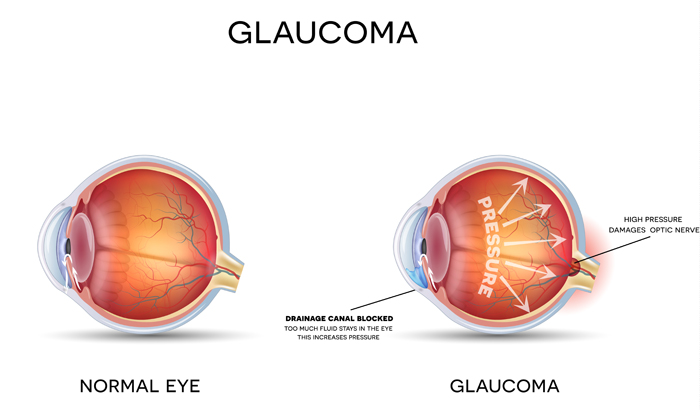Glaucoma Treatment & Diagnostics in Chirag Enclave, Delhi
Glaucoma
Glaucoma is an eye disease that is caused by damage to the nerve supplying the eyes, also known as the optic nerve. As the nerve is a part of the vision system, any damage to this nerve impairs vision. This damage is usually caused by abnormally high pressure in the eyes.
If you have been diagnosed with glaucoma recently, you just need to search for a specialist in ophthalmology near me or an ophthalmology hospital near me or a glaucoma specialist near me.

What are the different types of glaucoma?
The main types are:
- Open eye
- Closed eye
Other types are:
- Congenital Glaucoma
- NTG or Normal-Tension Glaucoma
- Secondary Glaucoma
- Traumatic Glaucoma
- Uveitic Glaucoma
- Neovascular Glaucoma
- Pigmentary Glaucoma
- IridoCorneal Endothelial Syndrome (ICE)
- Pseudoexfoliative Glaucoma
What symptoms should I look out for?
Symptoms of closed-angle glaucoma usually come faster and clearer. If you notice any of the following symptoms, seek medical attention immediately:
- Seeing ring around lights
- Redness in your eye
- Loss of vision
- Upset stomach or vomiting
- The hazy appearance of eyes, especially for infants
- Pain in the eye
What causes glaucoma?
The fluid in the eye called aqueous humor usually drains out of the eye through a mesh tube. Blockage of this tube hampers the drainage system, resulting in fluid accumulation inside the eye. Sometimes experts don't know why there was a blockage in the first place. This can be inherited as well.
Less common causes:
- Chemical damage to the eye
- Blockage of blood vessels in the eye
- Serious eye infections
- Inflammatory diseases
Rare cause:
- Eye surgery to correct another condition (one eye may be worse than the other)
When do you need to see a doctor?
Note if you have any of the symptoms mentioned above, as pain is not always present. Sometimes, there can also be no symptoms. In this case, regular ophthalmology consultants can help you diagnose the condition early. See your ophthalmologist regularly so that they can diagnose and treat glaucoma before long-term vision loss.
Request an appointment at Apollo Spectra Hospitals, Chirag Enclave, Delhi.
Call 1860 500 2244 to book an appointment.
What are the risk factors?
Some of the factors that put you at a risk of glaucoma are:
- Over 40 years of age
- High eye pressure
- Family history of glaucoma
- High blood pressure, heart disease, diabetes or sickle cell anemia
- Prescription glasses
- Corneas that are thinner than usual
- Poor vision
- Previous eye injury
- Diabetes
- Prolonged use of steroids
What is the treatment for this?
Your doctor will take your detailed medical and family history and will check your eyes. Once the diagnosis is made, you will be recommended any of the following treatments depending on the severity of glaucoma you have:
- Eye drops
- Oral medications
- Laser surgery
- Microsurgery
Request an appointment at Apollo Spectra Hospitals, Chirag Enclave, Delhi.
Call 1860 500 2244 to book an appointment.
Conclusion
Lowering intraocular pressure helps maintain vision. So it is recommended to seek help early. Follow a treatment plan and undergo regular eye exams to maintain your vision.
Over time, the situation will only get worse as the disease affects the eye nerve. This is usually related to increased intraocular pressure. Glaucoma is usually inherited, so, yes family history is important. This usually only occurs in old age.
Elevated intraocular pressure can damage the optic nerve, which sends images to your brain. If the damage worsens, glaucoma can cause permanent vision loss that can be partial or even complete blindness in some years.
Trabeculoplasty to open the drainage area; Iridotomy, makes a small hole in the iris to allow fluid to flow more freely; cyclophotocoagulation, treats the middle layer of the eye to reduce fluid production.
Symptoms
Our Doctors
DR. MRIDULA MEHTA
MBBS, MS - Ophthalmo...
| Experience | : | 22 Yeras Experience |
|---|---|---|
| Speciality | : | Ophthalmology... | Location | : | Chirag Enclave |
| Timings | : | Mon to Sat : 10:00 A... |
Our Top Specialities
NOTICE BOARD
CONTACT US
CONTACT US
 Book Appointment
Book Appointment



.svg)
.svg)
.svg)
.svg)








